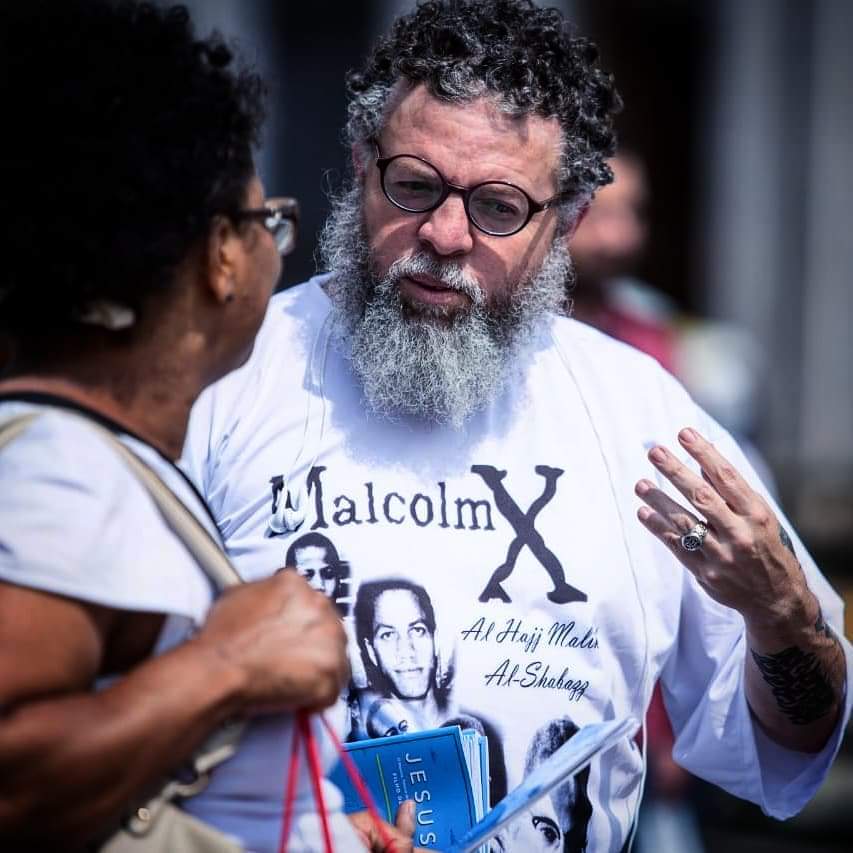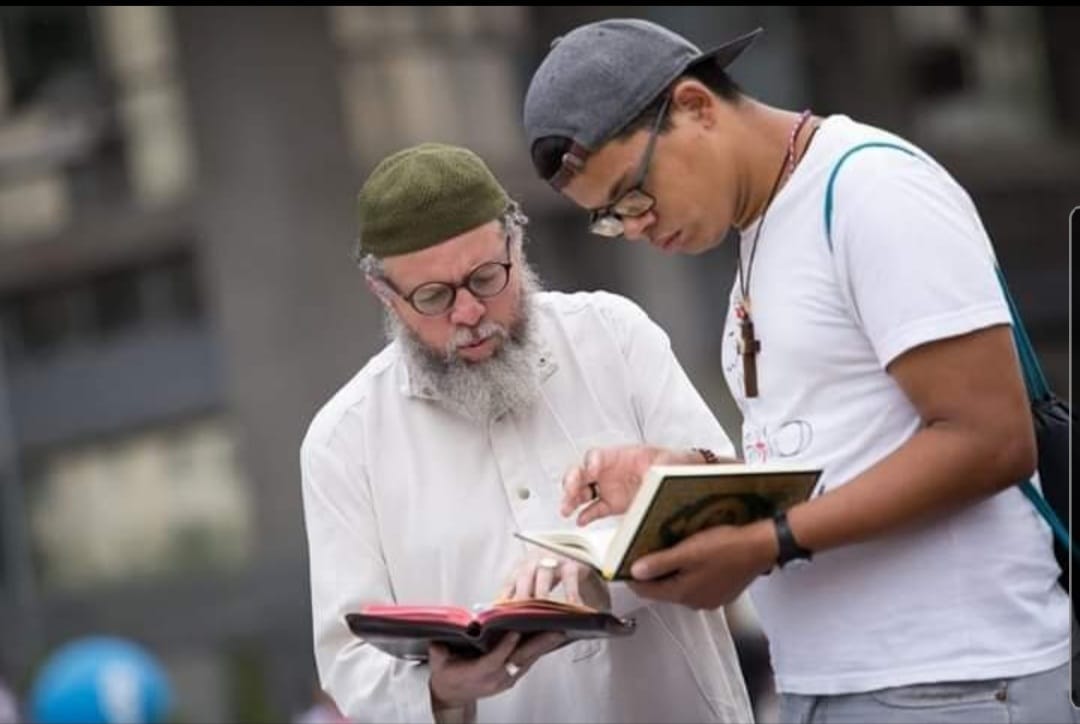SAO PAULO: Over the past two decades, there has been a visible rise in the number of Muslim converts in the poor outskirts and slums of Brazil’s large cities.
New mosques have been established in neighborhoods with no history of welcoming Middle Eastern immigrants.
Nobody knows for sure the size of Brazil’s Muslim population. In 2010, when the most recent census was conducted by the government, 35,000 Brazilians declared themselves as Muslim, a very small proportion of the total population of 210 million. Many in the country believe that the number is much higher now.
In 2012, Cesar Kaab Abdul established a mosque in Jardim Cultura Fisica, a slum in the city of Embu das Artes, in the Sao Paulo metropolitan area.
A community organizer for decades, he was part of the first generation of hip hop artists in Brazil in the 1980s, and became known in that sphere as a rapper and cultural activist.
Cesar’s mosque was named after Sumayyah bint Khayyat, a member of the Prophet Muhammad’s community.
“I chose a woman’s name to show that the idea that women are oppressed in Islam is only a prejudice,” he told Arab News.
Cesar’s first contact with Islam was through Malcolm X’s autobiography, which commonly circulates among black resistance movements.
“Most rappers had Malcolm X as a reference, but his religiousness usually went unnoticed,” he added.
As an office clerk in Sao Paulo’s financial district, Cesar had a Muslim Arab co-worker and became curious about his breaks to pray during office hours. “He told me he was Muslim, and I remembered Malcolm X’s story,” he recalled.
Cesar kept rapping and attained some success. His band even performed at US rapper Ja Rule’s concert in Brazil.
But he remained interested in Islam and would continually look for information about it online.
In 2007, he got in touch with a Muslim preacher in Egypt who instructed him and sent him books about Islam. From that point on, Cesar’s life began to deeply change.
“I used to be very radical on Islam’s cultural and political aspects … but then I began to understand its true nature,” he said.
In 2014 Cesar performed Hajj, which was “a deeply transforming experience.” At that time, he had already ceased to take part in music concerts and to drink alcohol. As well as his mosque, he established a center for the dissemination of Islam.
Many of his hip hop colleagues followed his example and converted to Islam. Cesar began to use his cultural influence to spread the prophet’s message, distributing Qur’ans even to high-profile Brazilian rappers such as Dexter and Mano Brown.

His mosque became a social center, and during the COVID-19 pandemic it distributed at least 30 tons of food to the neediest in the region.
One of the fruits of his work was the conversion of Kareem Malik Abdul, a master of capoeira, a combination of dance and martial art created by African slaves during the slavery era in Brazil (1500-1888).
“Capoeira has a connection with Afro-Brazilian religions,” Kareem told Arab News. “At first I resisted the idea of going to the mosque when Cesar invited me, but then I saw how Islam changed his life.”
A longtime member of a capoeira group, he did not like the jokes his colleagues would make about him after his conversion.
“At times, somebody would say in front of everybody at the gym that I was carrying bombs in my backpack. As a Muslim, I was seen as a terrorist,” said Kareem, who decided to leave his colleagues and start his own capoeira group.
“They saw capoeira as a form of fighting and could become violent sometimes. In my group, I decided to focus on the musical, cultural and historical dimensions of capoeira, emphasizing the human aspect.”
The idea of taking extra care with the physical safety and limitations of all participants came from Islam, Kareem said.
He ended up developing a teaching method based on motivation, which attracted children with Down syndrome to his classes.
A black militant, he usually tells his students about the malês, which is what Muslim Africans — usually brought from West Africa — were called during Brazil’s slavery era, especially in the 19th century.
In 1835, they led a famous rebellion for freedom in Salvador, capital of the state of Bahia.
“I am sure some of the malês were capoeira fighters,” said Kareem, who celebrated when another capoeira master converted to Islam due to his work.
Jamal Adesoji, a 40-year-old biologist and rapper from the city of Pelotas, is also an enthusiast of the malês’ history.
A black militant, he first discovered Islam after watching a movie about Malcolm X. Years later, he sought the help of Palestinian immigrants in his city to learn more about the religion.
“I frequented mosques in Rio de Janeiro and Sao Paulo, and at times I felt discriminated against for not being Arab and for being black,” he lamented.
Over the years, Adesoji met many African Muslims and started to feel part of a joint identity.
“I studied and discovered that there were malês and even Islamic schools in my city in the 19th century,” he said.
“Islam first arrived in Brazil with the Africans, so it’s part of our identity — a part that was erased over time.”
Adesoji frequents a mosque in the city of Passo Fundo that was created years ago by Muhammad Lucena, a convert from Sao Paulo.

The mosque gathers 1,000 people. About 150 of them are Brazilian converts, while the others are West African and South Asian, mostly workers at halal units in meat and poultry processing plants.
Lucena was a black militant in Sao Paulo whose group began collectively studying Malcolm X’s works at the beginning of the 1990s.
They decided to go to a mosque in the neighborhood to learn more about Islam. Lucena and a friend ended up converting.
In 1997, he received a scholarship to study in Libya — a turbulent time due to international sanctions imposed on Muammar Gaddafi’s regime.
After a tough time adapting to his new life — he only spoke Portuguese and did not know anybody in Libya — Lucena managed to learn Arabic and studied at university for three years.
“When I came back to Brazil, all I had in my mind was to disseminate the prophet’s message,” he said.
Lucena was invited to work in the halal industry in the state of Rio Grande do Sul. “Many Brazilians converted after meeting their Muslim colleagues in the processing plant, especially people from the city’s poorest regions,” he recalled.
The rapid growth of the Passo Fundo community called the attention of a Kuwaiti donor, and Lucena was able to buy a building and establish a mosque.
“Some of the Brazilian families who ended up leaving the city and going back to their original regions created Muslim communities there too,” he said.
Lucena believes that Islam will keep growing in the country as more Brazilians are getting involved in its dissemination.
Syrian-born Jihad Hammadeh, a prominent sheikh in Brazil, told Arab News: “Brazil erased the great Muslim African figures from its history. Reparation is necessary at all levels while blacks’ rights aren’t respected.”
He celebrates the fact that there are now many sheikhs in the country able to guide converts through their journey, which will avoid possible distortions.
“Although Brazilian Islam was consolidated by Arab immigrants, now things have changed,” Hammadeh said.
“Some time ago, it was unthinkable that a convert could assume leadership of an Islamic institution. Now it’s more and more common.”


